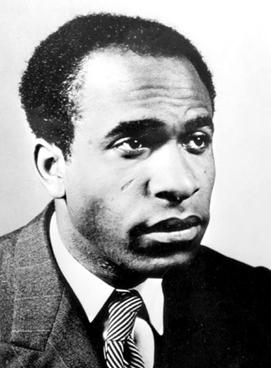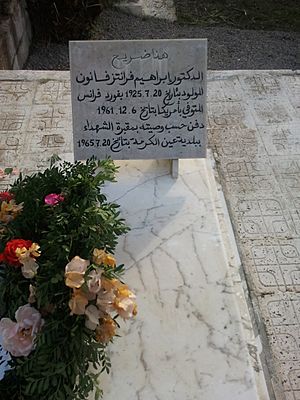Frantz Fanon facts for kids
Quick facts for kids
Frantz Fanon
|
|
|---|---|
 |
|
| Born | 20 July 1925 Fort-de-France, Martinique, French West Indies
|
| Died | 6 December 1961 (aged 36) Bethesda, Maryland, U.S.
|
| Alma mater | University of Lyon |
|
Notable work
|
Black Skin, White Masks; The Wretched of the Earth |
| Spouse(s) | Josie Fanon |
| Region | Africana philosophy |
| School | Marxism Black existentialism Critical theory Existential phenomenology |
|
Main interests
|
Decolonization and Postcolonialism, revolution, psychopathology of colonization, racism, Psychoanalysis |
|
Notable ideas
|
Double consciousness, colonial alienation, To become black, Sociogeny |
|
Influences
|
|
|
Influenced
|
|
Frantz Omar Fanon (born July 20, 1925 – died December 6, 1961) was an important thinker, psychiatrist, and political writer from Martinique, which was a French colony. He is known for his ideas about how colonization (when one country takes control of another) affects people's minds and societies. His writings have greatly influenced studies about life after colonialism and how people fight for freedom.
Fanon was also a doctor and psychiatrist. He supported Algeria in its fight for independence from France and was part of the Algerian National Liberation Front. Many people consider him one of the most important thinkers against colonialism of his time. For over 50 years, his life and work have inspired groups fighting for freedom in places like Palestine, Sri Lanka, South Africa, and the United States. He believed that people with mental health issues would do better if they were part of their families and communities, rather than being kept in hospitals.
Contents
Frantz Fanon's Life Story
Growing Up in Martinique
Frantz Fanon was born on the Caribbean island of Martinique. At that time, it was a French colony. His father, Félix Casimir Fanon, was a customs agent whose family came from African slaves. His mother, Eléanore Médélice, was a shopkeeper with both Afro-Martinican and white European roots.
Frantz was one of eight children in a middle-class family. He went to the best high school in Martinique, Lycée Schoelcher. There, he admired his teacher, the famous poet and writer Aimé Césaire, who later became a big influence on him.
World War II and Racism
When France was taken over by the Nazis in 1940, French naval troops were stuck in Martinique. They took control of the island and treated the local people badly. Fanon saw this unfair treatment and felt angry about colonial racism.
At 17, Fanon left Martinique to join the Free French forces that were fighting against the Nazis. He joined an all-black battalion and fought in France. He was even wounded and received a medal. However, he also experienced racism from white Europeans during the war. For example, some European women preferred to dance with captured Italian soldiers rather than the black soldiers who had helped free them.
After the war, Fanon returned to Martinique briefly. He helped his mentor, Aimé Césaire, in a political campaign. Then, he moved to France to study medicine and psychiatry.
Studying and Writing in France
Fanon studied in Lyon, France, where he also learned about literature and philosophy. In 1951, he became a psychiatrist. He worked at a hospital where he learned from a doctor who believed that culture plays a big role in mental health.
While in France, Fanon wrote his first important book, Black Skin, White Masks, published in 1952. This book explored the negative effects of colonialism on black people's minds. He wrote it because of the racism he faced while studying. In the book, Fanon described how black people in France felt inferior and were often looked down upon by white people. He believed that even if they spoke French perfectly, they couldn't fully fit into white society.
In 1952, Fanon married Josie Dublé. They had a son, Olivier. He also had a daughter, Mireille, from a previous relationship.
Working in Algeria and Fighting for Freedom
In 1953, Fanon moved to Algeria and became the head of a psychiatric hospital. He started using new ways to treat patients, focusing on their cultural backgrounds. He also trained nurses and interns.
When the Algerian War for independence began in 1954, Fanon secretly joined the Front de Libération Nationale (FLN). He treated both French soldiers who suffered from their actions during the war and Algerian victims of torture. He traveled across Algeria to understand the local culture and help the FLN.
By 1956, Fanon realized he could no longer support the French government. He resigned from his hospital job, and his resignation letter became an important text for anti-colonial groups.
Exile and Final Work
Fanon was then forced to leave Algeria and moved to Tunis. There, he openly joined the FLN and wrote for their newspaper, Al Moudjahid. He also served as an ambassador for the Algerian government to Ghana.
During his travels, Fanon became very ill and was diagnosed with leukemia, a type of cancer. He went to the Soviet Union for treatment. When he returned to Tunis, he wrote his last and most famous book, The Wretched of the Earth. He also met with the famous philosopher Jean-Paul Sartre, who wrote the introduction for his book.
Frantz Fanon died in the United States on December 6, 1961, at the age of 36. He was buried in Algeria. His wife, Josie, and his children, Olivier and Mireille, continued his legacy. Mireille became a professor and president of the Frantz Fanon Foundation.
Frantz Fanon's Important Books
Black Skin, White Masks
This book, published in 1952, explores how colonialism affects the minds of black people. Fanon looked at how black individuals felt they had to act "white" to fit into a white-dominated world.
Language and Identity
In a chapter called "The Negro and Language," Fanon discussed how black people were seen by white people. He explained that black individuals often felt they had to act differently around white people than around other black people. He believed that speaking the language of the colonizer (French) was a way for black people to try and gain acceptance. However, he also pointed out that this desire to speak "white" French showed a dependence that made black people feel less human.
Relationships and Colonialism
Fanon also explored how feelings of inferiority, caused by colonialism, affected relationships between black and white people. He discussed how some black women might idealize white men, believing that being with a white man would make them closer to "whiteness." He also looked at how black men might feel pressured to avoid stereotypes when trying to form relationships with white women. Fanon stressed that these experiences were complex and not just about race, but also about individual personalities and past experiences.
Understanding Black Experiences
In "The Fact of Blackness," Fanon talked about how black people experience their bodies and identity differently. He explained that because of the history of racism, there isn't one simple way to understand what it means to be black. He felt that black people are always seen in relation to their race and its history, making it hard for them to be seen just as individuals. He argued that traditional ways of thinking about human existence didn't fully capture the "lived experience" of black people.
Mental Health and Racism
In "The Negro and Psychopathology," Fanon showed how being black can affect a person's mental health. He argued that the unfair treatment of black people causes emotional pain. He believed that black people often couldn't escape thinking about their blackness and all the historical and current challenges that come with it. Fanon's work highlighted that many traditional ideas in psychology didn't consider the unique experiences of black people.
A Dying Colonialism
Published in 1959, this book describes how the people of Algeria changed their old cultural ways to fight against their French rulers. Fanon explained that for colonized people, fighting back was sometimes the only way to give meaning to their struggle. The book also discusses how oppressed people work to free their minds from colonial ideas and avoid losing their own culture.
The Wretched of the Earth
This book, published in 1961 shortly before Fanon's death, is his most famous work. In it, Fanon argued that colonized people have a right to use violence to gain their independence. He believed that the colonizers used force to control, so resistance also had to be forceful. He saw this as the only "language" the colonizer understood. The book also warns newly independent nations about the dangers of becoming "neo-colonial," where they are still controlled by outside powers in new ways.
Fanon's work in this book became a guide for many freedom movements around the world. He emphasized that the colonized people needed to realize their own humanity to begin their fight for freedom.
Who Influenced Frantz Fanon?
Fanon was influenced by many thinkers, including Jean-Paul Sartre and Karl Marx. A very important influence was his teacher, Aimé Césaire. Césaire was a leader of the Négritude movement, which celebrated black culture and identity. Fanon learned about Négritude from Césaire in high school and often referred to Césaire's writings in his own books.
Frantz Fanon's Lasting Impact
Fanon's ideas have had a huge impact on anti-colonial and national liberation movements worldwide. His book The Wretched of the Earth especially influenced leaders like Ali Shariati in Iran, Steve Biko in South Africa, Malcolm X in the United States, and Che Guevara in Cuba.
In the United States, Fanon's work was very important to the Black Power movement. Leaders like Stokely Carmichael and Bobby Seale of the Black Panther Party studied his books. They used Fanon's ideas to understand how black people in America were like a colony within a nation. They believed black people should create their own systems and build their own sense of humanity, rather than just trying to fit into existing systems.
Fanon's influence also reached Latin America, with thinkers like Fausto Reinaga in Bolivia and Raúl Zibechi in Latin America's left-wing politics. His work also greatly affected the Brazilian educator Paulo Freire.
Many African writers, such as Ayi Kwei Armah and Ngũgĩ wa Thiong'o, have also been deeply influenced by Fanon. Ngũgĩ even said that it's "impossible to understand what informs African writing" without reading Fanon's Wretched of the Earth.
Today, Fanon's ideas continue to be studied in fields like Black Studies. Scholars use his work to understand the deep effects of anti-blackness and how it shapes society.
Images for kids
See also
 In Spanish: Frantz Fanon para niños
In Spanish: Frantz Fanon para niños
 | William Lucy |
 | Charles Hayes |
 | Cleveland Robinson |



